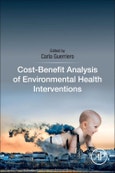Cost-benefit Analysis of Environmental Health Interventions clearly articulates the core principles and fundamental methodologies underpinning the modern economic assessment of environmental intervention on human health. Taking a practical approach, the book provides a step-by-step approach to assigning a monetary value to the health benefits and disbenefits arising from interventions, using environmental information and epidemiological evidence. It summarizes environmental risk factors and explores how to interpret and understand epidemiological data using concentration-response, exposure-response or dose-response techniques, explaining the environmental interventions available for each environmental risk factor. It evaluates in detail two of the most challenging stages of Cost-Benefit Analysis in 'discounting' and 'accounting for uncertainty'. Further chapters describe how to analyze and critique results, evaluate potential alternatives to Cost-Benefit Analysis, and on how to engage with stakeholders to communicate the results of Cost-Benefit Analysis. The book includes a detailed case study how to conduct a Cost-Benefit Analysis. It is supported by an online website providing solution files and detailing the design of models using Excel.
Please Note: This is an On Demand product, delivery may take up to 11 working days after payment has been received.
Table of Contents
1. The key steps in cost-benefit analysis of environmental health interventions2. Environmental health interventions for the treatment of waters, solids, and soils
3. Health impact assessment: quantifying the health benefits and costs
4. Monetary analysis of health outcomes
5. Health benefit analysis: monetization of health impacts and its use in environment and health
6. Costing environmental health intervention
7. Discounting benefits and costs
8. Quantifying uncertainty in environmental health models
9. Alternatives to cost-benefit analysis for economic evaluation
10. Climate change and ecological public health: an integrated framework
11. Case study: a realistic contaminated site remediation and different scenarios of intervention
12. Conclusion








